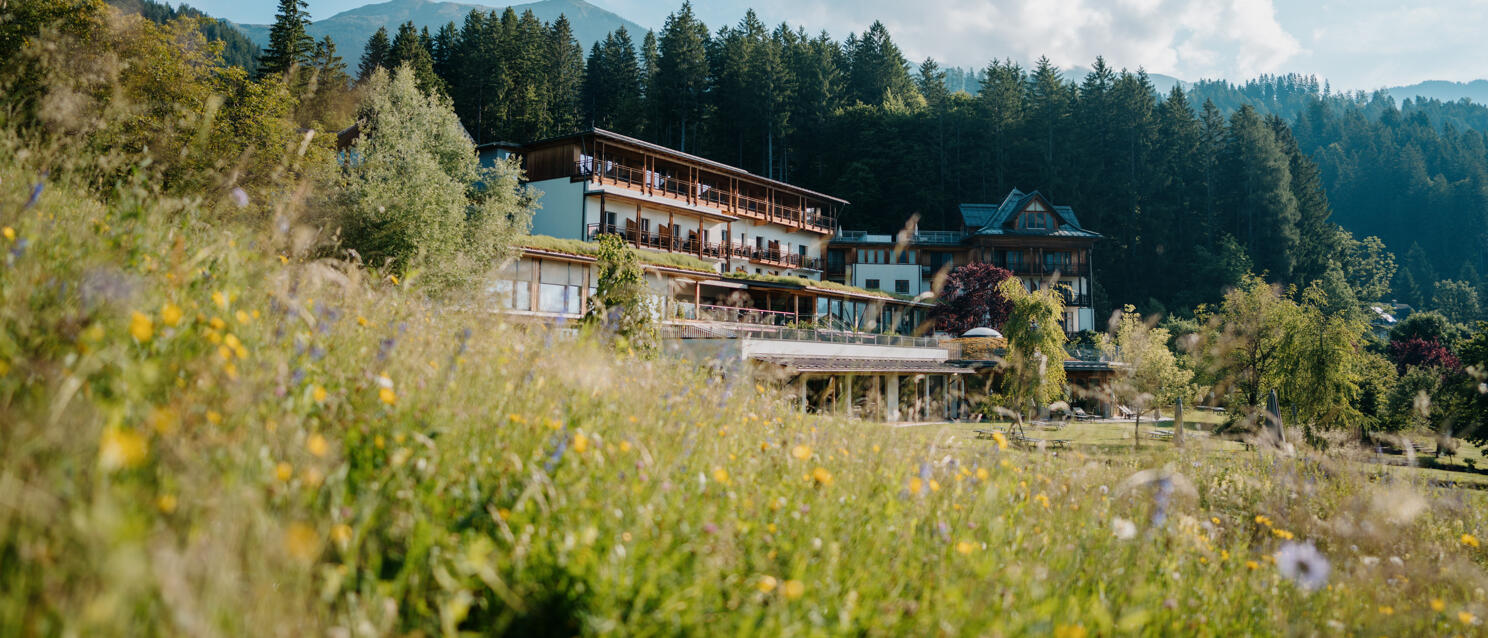Herbal Experiences: Hikes, Villages, Hotels

Austria's herbs are a natural world full of treasures. Herbs are true all-rounders. They enhance our cuisine, have enriched natural healing traditions for generations, and now play a starring role in the world of wellness. How wonderful that garden herbs and wild herbs alike are regaining the value they so deserve. Entire villages have made these special plants their focus, bringing them to life in “herb villages” where you can experience them with all your senses.
Ancient knowledge about culinary and healing herbs breathes life into this fascinating world. On guided herb walks, in herb hotels, workshops, cooking classes, and even on menus, visitors can enjoy the magic of herbs up close. From the herb village of Irschen in Carinthia’s Drau Valley to fragrant herb hikes through the blooming meadows of Vorarlberg and Styria — everywhere, nature’s bounty is ready to be discovered. Herb hotels invite you to relax and unwind with natural treatments and aromatic herb gardens.
Let yourself be surprised! These journeys into the world of herbs offer a refreshing new perspective on nature, taste, and well-being.
Herb walks and herbal experiences in Austria
Austria’s herb trails lead across blooming meadows, through forests, and up to Alpine heights — a journey for all the senses. In the organic herb show garden in Southern Burgenland, healing and culinary herbs flourish, while the Vitalpinum in Tirol brings the power of Alpine plants to life.
In Vorarlberg, on the Hochkönig in SalzburgerLand, and in Upper Styria, guided herb walks lead across mountain pastures, where freshly gathered herbs can be tasted on the spot. Around Lake Wörthersee, in Zell am See, and in Absam’s herb fields, hiking is beautifully combined with knowledge and well-being. From wild herb workshops to fragrant gardens — nature offers unforgettable experiences that refresh both body and mind.
Herb villages in Austria
Austria’s Herb Villages preserve and celebrate regional knowledge of Alpine healing herbs.
They invite visitors to experience this tradition firsthand. From guided herb walks with local herbal experts to hands-on DIY workshops, there are countless ways to explore. Discover organically cultivated herb gardens and meadows grown using sustainable methods, and enjoy herbal cuisine made with wild and garden-fresh herbs. Wellness takes on a new meaning in herb saunas, fragrant gardens, and peaceful meditations in the middle of blooming herb meadows.
In the nature and herb village of Irschen in Carinthia’s Drau Valley, herbs flourish in abundance. Here, a true way of life has taken root—one that brings people and nature back together. The motto: feel, understand, and rediscover the value of nature. Daily life in the village surrounds you with a sense of pleasure, awareness, and quality of life, rooted in wellbeing and care.
Herb hotels in Austria
Can't get enough of the soothing scent and strong taste of herbs? - Welcome to Austria's herbal hotels! Here, the power of nature unfolds in spa treatments, steam baths and homemade care products. Aromatic herb gardens are laid out for collecting and processing, while wild herbs enrich the cuisine. Guided herb walks and mindfulness rituals round off the experience: a mix of relaxation, enjoyment and closeness to nature in a decelerated retreat.
One of these special places is the daberer organic hotel in Carinthia. The lady of the house, Inge Daberer, is a trained chef and specialises in herbalism. Guests can immerse themselves in the fascinating world of herbs in the hotel's lush herb garden, which has been certified organic since 1978, making it a true pioneer. You may never have heard of many of the plants that grow at Inge Daberer's: wasabi rue, hart's-tongue plantain, blue chicory, summer purslane ...
And if you want to bake herb baguettes, make syrup or learn one of the many herb secrets, Inge Daberer is the right place for you.
Herb restaurants and aromatic herbal creations
Freshly picked, dried or preserved in oil - herbs are worth their weight in gold when it comes to subtle, intense or surprising flavors. They add depth to dishes, evoke memories and delight the palate.
In Austria's cuisine, local herbs meet creative culinary art. Whether in top Alpine restaurants, inns or manufactories - herbs enhance dishes, cheeses, liqueurs and even desserts. This creates intense taste experiences that combine nature and cuisine in a special way.
An outstanding example of exquisite herbal cuisine is Vitus Winkler's gourmet restaurant Kräuterreich in Sankt Veit im Pongau in SalzburgerLand. Here, edible works of art are created that have already been awarded 2 stars and 4 toques.
Herbal recipes: Cooking with nature
Wild herbs: True jack-of-all-trades
Wild herbs are the silent heroes of the meadows and true nutrient boosters that can often contain more vitamins, minerals and secondary plant substances than cultivated herbs. Their high adaptability to a wide range of conditions makes them particularly resilient - and it is precisely this power that lies within them. They can have an antibacterial and digestive effect and support well-being.
Hundreds of wild herbs can be found in Austria's Alpine nature. Their valuable essences can be found in nourishing tinctures and ointments. And their unique aromas enrich both naturopathy and cuisine: from the spicy pungency of watercress to the gentle sweetness of violets - wild herbs lend dishes an incomparable depth. Because they thrive without artificial fertilization or cultivation, they are sustainable and bring the unadulterated taste of nature to the plate.
What Austria's wild herbs can do
Climate Protection Info
Why is Alpine pasture farming so important?
Alpine pasture farming contributes to the preservation of the cultural landscape and the safety of the valleys. Managed alpine pastures protect against avalanches and mudflows.
Alpine pasture management prevents scrub encroachment and thus promotes biodiversity.
Far more different herbs grow on alpine meadows than on the valley floor. This biodiversity is important for nature.
Alpine farmers and dairy farmers produce high-quality dairy products from cows, sheep and goats - mostly in organic quality.
Alpine pastures are an energetic recreation area in a beautiful mountain landscape, pristine and simple.